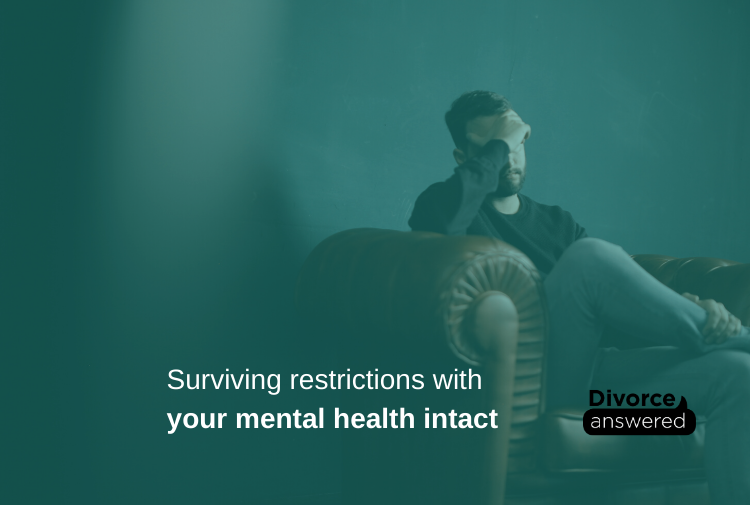
TIPS FOR MENTALLY MANAGING YOUR TIME WHILE IN QUARANTINE OR ISOLATION
There is no disagreement that COVID-19 is challenging many people and businesses. The social and economic pressures are mounting and seem unrelenting. Being mindful of what you are doing, how you are feeling and what others around you may also be feeling will be more important during social isolation or social distancing than ever before. Similar to divorce, the limitations placed upon many people globally at present is challenging their mental health and mental stability. Restrictions associated with travel, work, lifestyle and entertainment and socialising may incite new feelings to arise within you. Rachael Scharrer, Life Change Counsellor and Separation Strategist at Divorce Answered, explores the likely feelings you may encounter and ways that you can support your mental health during the time of restriction
During the restrictions, you may experience LONELINESS AND ISOLATION. Loneliness is a feeling of sadness or distress about being by yourself or feeling disconnected from the world around you. Isolation is feeling distanced or separated from others which is outside of your usual routine. It is possible to feel lonely even when people are around you.
Another feeling that you may experience is INCREASED ANXIOUSNESS. Anxiety Is a feeling of stress and/or worry. Other signs may include agitation, restlessness, tiredness, tension, irritability, feeling wound-up or poor concentration.
Equally, you may feel DEPRESSED. Depression can feel like sadness, grief, downheartedness and hopelessness.
Note: While you might feel lonely, isolated, anxious or depressed, it doesn’t necessarily mean that you have the medical condition of depression or anxiety. If you feel that your emotions are overwhelming or excessive, please consult your local doctor or GP.
Loneliness, isolation, anxiousness and despondent may be new feelings for some people. These can affect your self-confidence, self-work and self-esteem. Here are six tips to help you survive:
Tip 1: Be mindful of emotional eating/drinking and comfort eating during this time. Being at home and near the kitchen makes food incredibly accessible. Adding to the situation is boredom or stress which can encourage some people to mindlessly eat. Meal planning and setting meal and snack times can be helpful.
Tip 2: Be mindful of your emotional regulation. During times of stress and anxiety, you may be more likely to get upset or angry with those closest to you – often they will be the people you are stuck at home with. Try to be mindful of your reactions and the way that you are speaking to others. Regularly meditate, focus on your breath and create a little time-out for you.
Tip 3: Create routine and structure. Children and adults alike thrive on structure and routine. It creates a purpose for the day and helps the time pass-by with a little more ease. Some people benefit from writing the structure and routine for each day on a piece of paper and placing it somewhere prominent. Others might like to use the alarms on their phone. Whatever your chosen method, a structure and routine can help to starve the loneliness and
Tip 4: Exercise at home. With gyms closed, there are many great ways of squeezing in some exercise into your daily routine. Moving will help you to burn energy and help you sleep better. Some great sites with free and affordable routines that you can follow – Google and YouTube are helpful resources to search.
Tip 4: Get good sleep. Sleeping well helps you to heal, re-charge and aids in your mental wellbeing. Research shows that lack of sleep while driving can have the same effect as driving under the influence, so it is understandable that when you are well rested you have more control over your emotional regulation.
Tip 5: Set yourself goals. Setting yourself tasks helps to create purpose – during a time of restrictions, it’s more important than ever to have a productive reason to keep busy. You might like to consider setting yourself a home project, write a list of goals or work aspirations that you can work towards. If career progression is important to you, you might like to enrol in an online course. It’s helpful to break each item/project/goal down into smaller bite sized chunks that you can achieve and schedule time into your daily routine to spend on your goals so that obtaining your end result isn’t so daunting or overwhelming. It’s always nice to see items being checked-off the list! By the end of the restriction period you will feel good for investing in yourself and your home.
Tip 6: Choose your perspective. You can choose your attitude and how you view your situation and challenges. You could take a negative position and be glum, you could succumb to depression and feel like giving up or you could choose to see the positives and make the restrictions work for you. If you want to exercise the latter, it can start with talking in the positive, seeing the opportunities available to you and embracing.
Your time that is spent with restrictions, quarantine or isolation doesn’t have to be bleak – you can choose to take control of your life through the restrictions or allow the time in restriction to control you. If you are able to take charge of your time, you will emerge from the restrictions a productive person who is likely to feel more whole with a positive mindset on their forced time at home.
If you or someone you know needs help, the following phone numbers may be helpful: Lifeline: 131 114 Beyond Blue: 1300 224 636
RELATED ARTICLES: